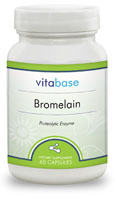Bromelain is an enzyme found in pineapples that breaks down other proteins, such as collagen and muscle fiber. Bromelain is not a single substance, but rather a collection of enzymes and other compounds. It is a mixture of sulfur-containing protein-digesting enzymes, called proteolytic enzymes or proteases. It also contains several other substances in smaller quantities, including perioxidase, acid phosphatase, protease inhibitors, and calcium. Bromelain is one of a group of proteolytic enzymes (enzymes capable of digesting protein). Proteolytic enzymes (proteases and peptidases are also commonly used) are enzymes which break peptide bonds of proteins. In the body, proteolytic digestive enzymes are produced in the pancreas, but supplemental forms of enzymes may come from fungal or bacterial sources, extraction from the pancreas of livestock animals (trypsin/chymotrypsin) or extraction from plants. The primary uses of proteolytic enzymes in dietary supplements are as digestive enzymes, anti-inflammatory agents and pain relievers. Bromelain is mainly comprised of cysteine proteases, with smaller amounts of acid phosphatase, peroxidase, amylase and cellulase. Like all enzymes (papain and other proteases), bromelain breaks down the connecting structure that holds surface skin cells together. The process is called proteolytic cleavage. They use a molecule of water for this and are thus classified as hydrolases. |
 The main health areas in which bromelain has proven to be effective are as an anti-inflammatory, in reducing the time needed for wound healing, and as an aid to digestion. Apart from wound healing, the anti-inflammatory action of bromelain is also useful for reducing the pain and joint stiffness of chronic arthritis, easing the pain and swelling associated with gout, and helping sufferers of carpal tunnel syndrome. Click here for more information.
The main health areas in which bromelain has proven to be effective are as an anti-inflammatory, in reducing the time needed for wound healing, and as an aid to digestion. Apart from wound healing, the anti-inflammatory action of bromelain is also useful for reducing the pain and joint stiffness of chronic arthritis, easing the pain and swelling associated with gout, and helping sufferers of carpal tunnel syndrome. Click here for more information.